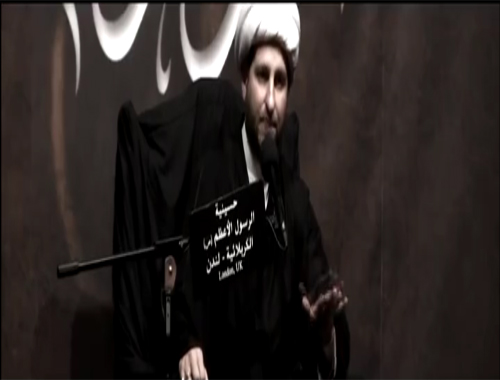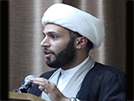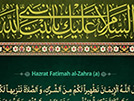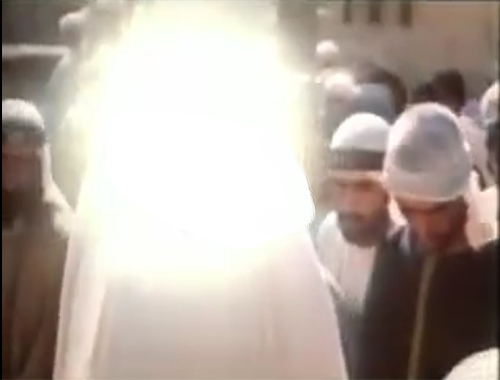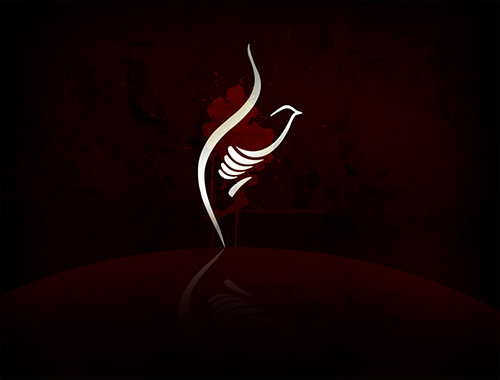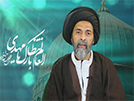Chapter Ten
- Details
- Hits: 4562
Chapter Ten
MISCELLANEOUS TRADITIONS
143. Through his chain of authorities, he, peace be on him, said: [Allah's Apostle, may Allah bless him and his family, said:] Allah, the Most High, says: "O son of Adam, do you not treat Me with justice? I show love toward you through favors and you show hatred toward Me through the acts of disobedience. My good descends to you, and your evil ascends to Me. A noble angel always brings Me an ugly deed from you on every day and night.
"O son of Adam, if you hear your description from other than you, and you do not know who the describer is, you will quickly detest him."
"O son of Adam, if you hear your description from other than you, and you do not know who the describer is, you will quickly detest him."
This Holy Tradition summons men to do good deeds and warns them against evil deeds.
144. Through his chain of authorities, he, peace be on him, said: [Allah's Apostle, may Allah bless him and his family, said: Allah, the Great and Almighty, says:] "O son of Adam, do not let the sins of men divert you from your own sin, nor (let) the favors of men divert you from those of Allah toward you. Do not drive men to despair of Allah's favor, while you hope them for your own soul."
This tradition orders man not to let the sins of men turn him away from his own sins, for every person is responsible for his own sins before Allah, the Exalted. In addition, it orders him not to let the favors which Allah bestow upon his servants divert him from His favors toward him.
145. Through his chain of authorities, he, peace be on him, said: [Allah's Messenger, may Allah bless him and his family, said:] "I fear for my community from three (things): error after knowledge, misleading discords, the lust of stomach and genital parts."
Certainly these three temptations turns man away from Allah, the Exalted, and throws him into dreadful evil.
146. Through his chain of authorities, he, peace be on him, said: [Allah's Apostle, may Allah bless him and his family, said concerning the interpretation of these words of Him, the Most High: (Remember) the day when We will call every people with their Imam:] "He (Allah) will call every people with the Ima`m of their time, the Book of their Lord, and the Sunna (practices and sayings) of their Prophet."
This tradition gives an account of mustering men on the Day of Resurrection. It indicates that every people will be mustered along with their Ima`m (leader), the Book of their Lord, and the Sunna of their Lord. If they obeyed them and put them into practice, they would be successful and be safe from the severe punishment of Allah, and if they opposed them, they would be unsuccessful.
147. Through his chain of authorities, he, peace be on him, said: [Allah's Messenger, may Allah bless him and his family, said:] "Allah will reckon every creature except him who associates a partner with Him, for He will not reckon him and order him (to be taken) to the Fire."
148. Through his chain of authorities, he, peace be on him, said: [Allah's Apostle, may Allah bless him and his family, said:] "Circumcise your boys on the seventh day, for it is the purest and quickest (act) in making flesh grow."
An example of wonderful Islamic legislation is that it summons the Muslims to circumcise male babies on the seventh day of their birth, for the circumcision in this age recovers quickly and the male baby does not suffer severe pain. If the baby exceeds this age, especially when its age exceeds three or four years, it faces difficulty and severe pain in circumcising.
149. Through his chain of authorities, he, peace be on him, said: [Allah's Apostle, may Allah bless him and his family, said:] "The wronged are neither praiseworthy nor rewarded."
As for the wronged, if they are ignorant, they do not deserve praise and reward, for they neglect their dealings; and if they are knowledgeable and adopt riches, then they are worthy of blame and dispraise.
150. Through his chain of authorities, he, peace be on him, said: [Allah's Messenger, may Allah bless him and his family, said:] "Do favor for those who are worthy of it and those who are not worthy of it. If you find those who are worthy of it, then they deserve it; and if you do not find those who are worthy of it, then you are among those who are entitled to it."
In this tradition there is a creative summons to doing favor and kindness to all men. This is one of good Islamic teachings standing on favor and kindness.
151. Through his chain of authorities, he, peace be on him, said: [Allah's Apostle, may Allah bless him and his family, said:] "The head of reason after religion is showing love toward men and doing favor for both the righteous and the sinful." Surely, showing love for men and making favor for them is a proof of ripe mind, sound reason, and insight.
152. Through his chain of authorities, he, peace be on him, said: [Allah's Apostle, may Allah bless him and his family, said:] "Verily, your mouths are ways to your Lord, so clean them."
This tradition summons the Muslims to clean their mouths through refraining from obscene and abominable words, saying the truth, polite words, and others.
153. Through his chain of authorities, he, peace be on him, said: [Allah's Apostle, may Allah bless him and his family, said:] "He who fasts on Friday with endurance and fore-thought is given the reward of ten honorable, brilliant days which the days of the world do not resemble."
This tradition awakens one's desire for fasting on Friday, which is the most honorable of the days of the week, for there is abundant repayment and great reward in fasting on it.
154. Through his chain of authorities, he, peace be on him, said: [Allah's Messenger, may Allah bless him and his family, said:] "Prefer the Garden to the Fire and do not invalidate your deeds, so you will be thrown into the Fire, bowing (your heads) and immortal therein."
The Prophet, may Allah bless him and his family, summons (people) to gain Paradise through sincere deeds and not to invalidate their deeds through hypocrisy, and others. In addition, he, may Allah bless him and his family, warns them against the Fire, may Allah protect us from it.
155. Through his chain of authorities, he, peace be on him, said: [Allah's Apostle, may Allah bless him and his family, said:] "There is no retiring into mosque for devotion (i'tikaf) except along with fasting."
As for prayer in seclusion (i'tikaf), it stands on fasting, and it should be in one of the mosques of Allah. As for fasting for i'tika`f, it should be for three days; and the one who performs i'tika`f has no right to leave the mosque except after the three days.
156. Through his chain of authorities, he, peace be on him, said: [Allah's Messenger, may Allah bless him and his family, said:] "If the servant sees the moment of his death and its speed, he will hate hope and seeking the world."
If man reflects on his fate and carefully considers his condition in the grave and his quick departure from this world, then he will detest hope and hate the world.
157. Through his chain of authorities, he, peace be on him, said: ['Ali b. Abu` Ta`lib related to me, saying:] "He who subjects himself to accusation and entering what brings about losing his dignity, certainly empowers mistrust over himself, and it is he who brings about that against himself."
158. Through his chain of authorities, he, peace be on him, said: ['Ali b. Abu` Ta`lib said:] "He who obeys a creature and disobeys the Creator has no religion."
Surely, he who obeys a creature through disobeying the Creator has no religion and no relationship with Allah, the Most High.
159. Through his chain of authorities, he, peace be on him, said: [Al-Husayn b. 'Ali, peace be on him, related to me, saying:] "Verily, the deeds of this community are brought before Allah, the Great and Almighty, every morning."
Definitely, the deeds of the Muslims are brought before Allah, the Exalted, every day, whether they are good or evil. So blessed is he who does good deeds and fears his Lord!
160. Through his chain of authorities, he, peace be on him, said: [My father 'Ali b. Abu` Ta`lib related to me concerning these words of Him, the Exalted: And certainly she made for him, and he would have made for her, were it not that he had seen the manifest evidence of his Lord, saying:] "The wife of al-'Azï~z (the Chief of Egypt) went to an idol and covered the idol, and then she said:
'It can see us!' So Yousif asked her: 'What is this?' 'I feel shame of the idol when it sees us!' she replied. So he asked her: 'Do you feel shame of the idol which cannot hear; nor can it see; nor can it benefit; nor can it harm? Why do you not feel shame of Him who has created things and has knowledge of them?' So that is His words, the Exalted: the manifest evidence of his Lord."
161. Through his chain of authorities, he, peace be on him, said: [When 'Ali b. Abu` Ta`lib, peace be on him, saw a sick person who got well, he said:] "Purity from sins congratulates you!"
Many traditions have been reported from the Ima`ms of guidance, peace be on them; the traditions indicate that illness purifies sick person from the sins which he had committed, and that it increases his good deeds.
162. Through his chain of authorities, he, peace be on him, said: [My father 'Ali b. Abu` Ta`lib, peace be on him, related to me, saying:] "We have taken three (things) from three (persons): Steadfastness from Ayyu`b (Job), gratitude from Nu`h (Noah), and envy from the children of Ya'qu`b (Jacob)."
163. Through his chain of authorities, he, peace be on him, said: [Mohammed b. 'Ali b. al-Husayn, peace be on them, was asked:] "Why was the Prophet, may Allah bless him and his family, orphaned?" He, peace be on him, replied: "Lest no creature should have a right against him."
Many traditions have justified the orphanage of the Messenger, may Allah bless him and his family. Yet there is another justification as follows:
This Orphan (i.e. the Prophet) could change the course of the world's history, save man from the fables and customs of those pagans who loved before Islam, established on earth a state which raised the torch of monotheism, brightened the regions of the world through the truth and justice.
With this matter we will end our talk about the Musnad and Sahïfa of Ima`m al-Rida`, peace be on him.
It is worth mentioning that I (i.e. the author) have dropped some traditions mentioned in these two books of the Ima`m, for I think that they are fabricated and do not belong to the traditions of the members of the House (ahl al-Bayt), peace be on them. Perhaps, for this reason some religious scholars have not ascribed this book (Sahïfa) to Ima`m al-Rida`, peace be on him, and not regarded it as evidence for some religious precepts.
144. Through his chain of authorities, he, peace be on him, said: [Allah's Apostle, may Allah bless him and his family, said: Allah, the Great and Almighty, says:] "O son of Adam, do not let the sins of men divert you from your own sin, nor (let) the favors of men divert you from those of Allah toward you. Do not drive men to despair of Allah's favor, while you hope them for your own soul."
This tradition orders man not to let the sins of men turn him away from his own sins, for every person is responsible for his own sins before Allah, the Exalted. In addition, it orders him not to let the favors which Allah bestow upon his servants divert him from His favors toward him.
145. Through his chain of authorities, he, peace be on him, said: [Allah's Messenger, may Allah bless him and his family, said:] "I fear for my community from three (things): error after knowledge, misleading discords, the lust of stomach and genital parts."
Certainly these three temptations turns man away from Allah, the Exalted, and throws him into dreadful evil.
146. Through his chain of authorities, he, peace be on him, said: [Allah's Apostle, may Allah bless him and his family, said concerning the interpretation of these words of Him, the Most High: (Remember) the day when We will call every people with their Imam:] "He (Allah) will call every people with the Ima`m of their time, the Book of their Lord, and the Sunna (practices and sayings) of their Prophet."
This tradition gives an account of mustering men on the Day of Resurrection. It indicates that every people will be mustered along with their Ima`m (leader), the Book of their Lord, and the Sunna of their Lord. If they obeyed them and put them into practice, they would be successful and be safe from the severe punishment of Allah, and if they opposed them, they would be unsuccessful.
147. Through his chain of authorities, he, peace be on him, said: [Allah's Messenger, may Allah bless him and his family, said:] "Allah will reckon every creature except him who associates a partner with Him, for He will not reckon him and order him (to be taken) to the Fire."
148. Through his chain of authorities, he, peace be on him, said: [Allah's Apostle, may Allah bless him and his family, said:] "Circumcise your boys on the seventh day, for it is the purest and quickest (act) in making flesh grow."
An example of wonderful Islamic legislation is that it summons the Muslims to circumcise male babies on the seventh day of their birth, for the circumcision in this age recovers quickly and the male baby does not suffer severe pain. If the baby exceeds this age, especially when its age exceeds three or four years, it faces difficulty and severe pain in circumcising.
149. Through his chain of authorities, he, peace be on him, said: [Allah's Apostle, may Allah bless him and his family, said:] "The wronged are neither praiseworthy nor rewarded."
As for the wronged, if they are ignorant, they do not deserve praise and reward, for they neglect their dealings; and if they are knowledgeable and adopt riches, then they are worthy of blame and dispraise.
150. Through his chain of authorities, he, peace be on him, said: [Allah's Messenger, may Allah bless him and his family, said:] "Do favor for those who are worthy of it and those who are not worthy of it. If you find those who are worthy of it, then they deserve it; and if you do not find those who are worthy of it, then you are among those who are entitled to it."
In this tradition there is a creative summons to doing favor and kindness to all men. This is one of good Islamic teachings standing on favor and kindness.
151. Through his chain of authorities, he, peace be on him, said: [Allah's Apostle, may Allah bless him and his family, said:] "The head of reason after religion is showing love toward men and doing favor for both the righteous and the sinful." Surely, showing love for men and making favor for them is a proof of ripe mind, sound reason, and insight.
152. Through his chain of authorities, he, peace be on him, said: [Allah's Apostle, may Allah bless him and his family, said:] "Verily, your mouths are ways to your Lord, so clean them."
This tradition summons the Muslims to clean their mouths through refraining from obscene and abominable words, saying the truth, polite words, and others.
153. Through his chain of authorities, he, peace be on him, said: [Allah's Apostle, may Allah bless him and his family, said:] "He who fasts on Friday with endurance and fore-thought is given the reward of ten honorable, brilliant days which the days of the world do not resemble."
This tradition awakens one's desire for fasting on Friday, which is the most honorable of the days of the week, for there is abundant repayment and great reward in fasting on it.
154. Through his chain of authorities, he, peace be on him, said: [Allah's Messenger, may Allah bless him and his family, said:] "Prefer the Garden to the Fire and do not invalidate your deeds, so you will be thrown into the Fire, bowing (your heads) and immortal therein."
The Prophet, may Allah bless him and his family, summons (people) to gain Paradise through sincere deeds and not to invalidate their deeds through hypocrisy, and others. In addition, he, may Allah bless him and his family, warns them against the Fire, may Allah protect us from it.
155. Through his chain of authorities, he, peace be on him, said: [Allah's Apostle, may Allah bless him and his family, said:] "There is no retiring into mosque for devotion (i'tikaf) except along with fasting."
As for prayer in seclusion (i'tikaf), it stands on fasting, and it should be in one of the mosques of Allah. As for fasting for i'tika`f, it should be for three days; and the one who performs i'tika`f has no right to leave the mosque except after the three days.
156. Through his chain of authorities, he, peace be on him, said: [Allah's Messenger, may Allah bless him and his family, said:] "If the servant sees the moment of his death and its speed, he will hate hope and seeking the world."
If man reflects on his fate and carefully considers his condition in the grave and his quick departure from this world, then he will detest hope and hate the world.
157. Through his chain of authorities, he, peace be on him, said: ['Ali b. Abu` Ta`lib related to me, saying:] "He who subjects himself to accusation and entering what brings about losing his dignity, certainly empowers mistrust over himself, and it is he who brings about that against himself."
158. Through his chain of authorities, he, peace be on him, said: ['Ali b. Abu` Ta`lib said:] "He who obeys a creature and disobeys the Creator has no religion."
Surely, he who obeys a creature through disobeying the Creator has no religion and no relationship with Allah, the Most High.
159. Through his chain of authorities, he, peace be on him, said: [Al-Husayn b. 'Ali, peace be on him, related to me, saying:] "Verily, the deeds of this community are brought before Allah, the Great and Almighty, every morning."
Definitely, the deeds of the Muslims are brought before Allah, the Exalted, every day, whether they are good or evil. So blessed is he who does good deeds and fears his Lord!
160. Through his chain of authorities, he, peace be on him, said: [My father 'Ali b. Abu` Ta`lib related to me concerning these words of Him, the Exalted: And certainly she made for him, and he would have made for her, were it not that he had seen the manifest evidence of his Lord, saying:] "The wife of al-'Azï~z (the Chief of Egypt) went to an idol and covered the idol, and then she said:
'It can see us!' So Yousif asked her: 'What is this?' 'I feel shame of the idol when it sees us!' she replied. So he asked her: 'Do you feel shame of the idol which cannot hear; nor can it see; nor can it benefit; nor can it harm? Why do you not feel shame of Him who has created things and has knowledge of them?' So that is His words, the Exalted: the manifest evidence of his Lord."
161. Through his chain of authorities, he, peace be on him, said: [When 'Ali b. Abu` Ta`lib, peace be on him, saw a sick person who got well, he said:] "Purity from sins congratulates you!"
Many traditions have been reported from the Ima`ms of guidance, peace be on them; the traditions indicate that illness purifies sick person from the sins which he had committed, and that it increases his good deeds.
162. Through his chain of authorities, he, peace be on him, said: [My father 'Ali b. Abu` Ta`lib, peace be on him, related to me, saying:] "We have taken three (things) from three (persons): Steadfastness from Ayyu`b (Job), gratitude from Nu`h (Noah), and envy from the children of Ya'qu`b (Jacob)."
163. Through his chain of authorities, he, peace be on him, said: [Mohammed b. 'Ali b. al-Husayn, peace be on them, was asked:] "Why was the Prophet, may Allah bless him and his family, orphaned?" He, peace be on him, replied: "Lest no creature should have a right against him."
Many traditions have justified the orphanage of the Messenger, may Allah bless him and his family. Yet there is another justification as follows:
This Orphan (i.e. the Prophet) could change the course of the world's history, save man from the fables and customs of those pagans who loved before Islam, established on earth a state which raised the torch of monotheism, brightened the regions of the world through the truth and justice.
With this matter we will end our talk about the Musnad and Sahïfa of Ima`m al-Rida`, peace be on him.
It is worth mentioning that I (i.e. the author) have dropped some traditions mentioned in these two books of the Ima`m, for I think that they are fabricated and do not belong to the traditions of the members of the House (ahl al-Bayt), peace be on them. Perhaps, for this reason some religious scholars have not ascribed this book (Sahïfa) to Ima`m al-Rida`, peace be on him, and not regarded it as evidence for some religious precepts.

